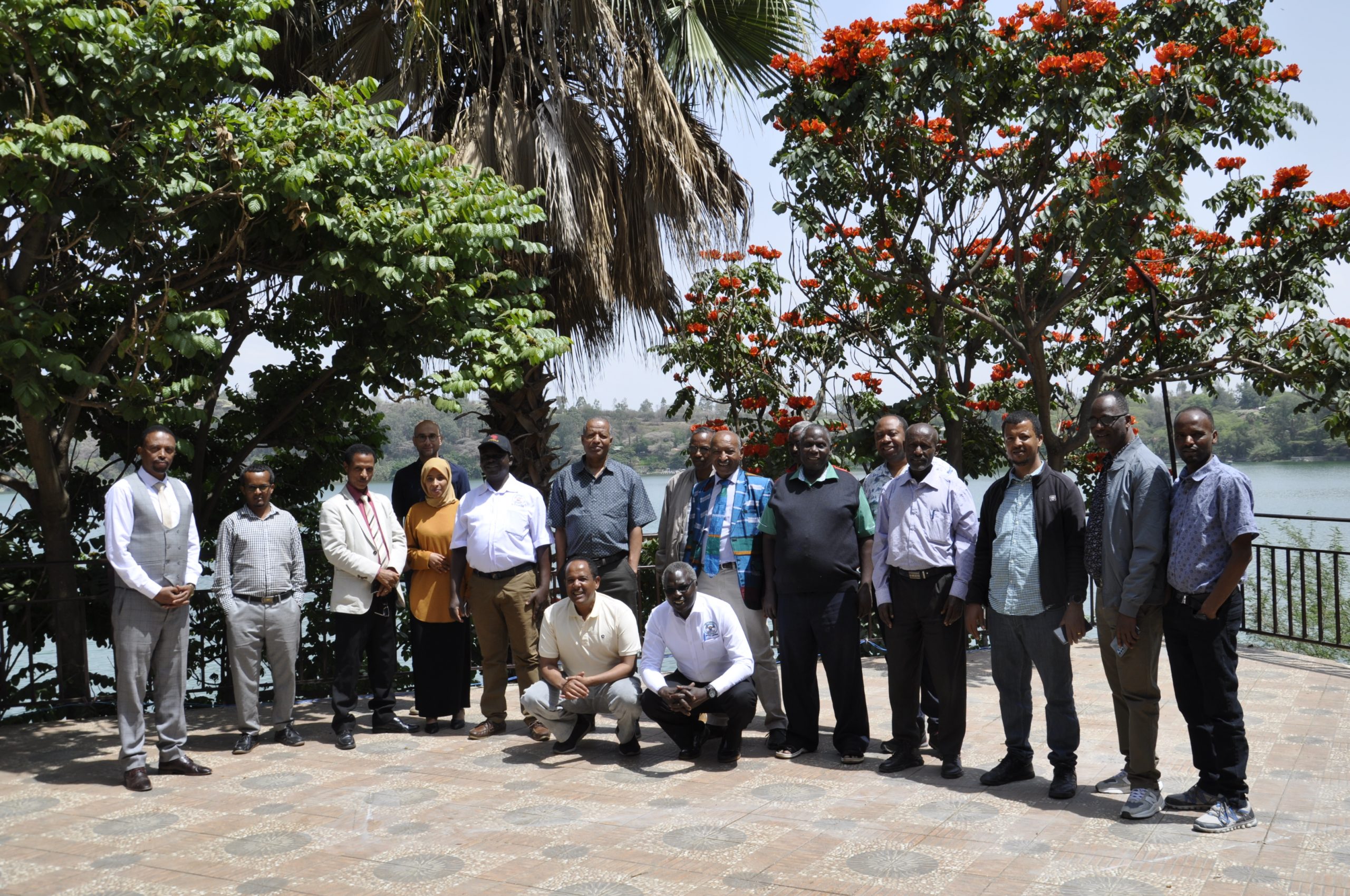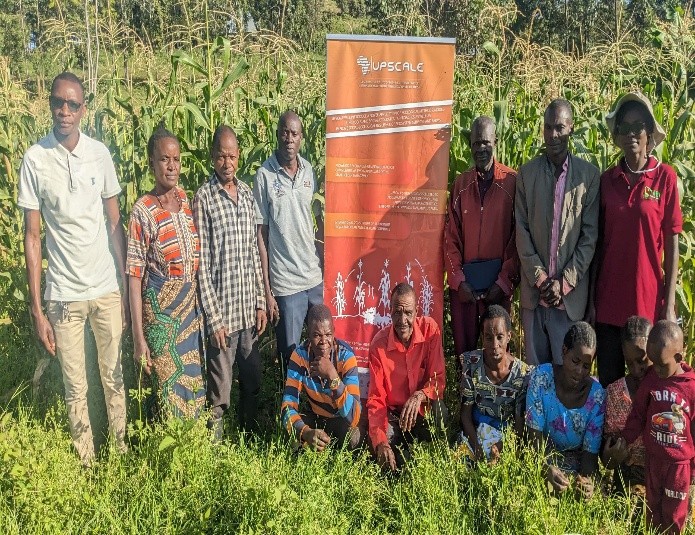Name of The Project:- UPSCALE-project
Name Of the event:- Ethiopian 2nd UPSCALE – project MAC meeting
Date: 3rd – 4th of June 2022
Organized by: ISD – UPSCALE project
Venue: Debrezeit, LISAK Resort
The main objective of the meeting
To unlock the potential for wider engagement, collaboration, and adoption of push-pull technology the Ethiopian MAC platform was established in Sep 2021 by engaging key stakeholders identified from private and government sectors by considering a multidisciplinary approach.
To enable MAC coordination the selection of the MAC management committee was also undertaken at the 1st MAC meeting.
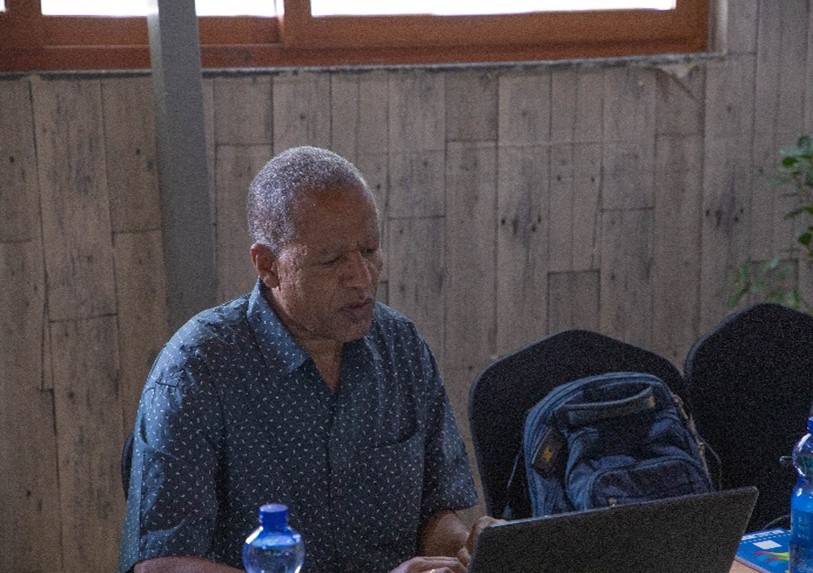 Ato Gizaw Gebremariam, ISD, Program manager
Ato Gizaw Gebremariam, ISD, Program manager Ato Ghebremedihen Belay, ISD, Executive Director
Ato Ghebremedihen Belay, ISD, Executive DirectorThe MAC national meeting was started by the brief welcome and words of thanks to the participant stakeholders both from abroad and Ethiopia by Ato Gizaw G.Mariam, the MAC management secretary. He introduced the time schedule of the two-day meeting and invited the MAC Chairperson and the Executive Director of ISD to address their respective welcoming and opening remarks. Dr Hailu Araya, the Chairperson of the MAC Committee and Director of PELUM Ethiopia has presented his welcoming address. He thanked participants for their commitment and their appearance in the meeting and highlighted the achievements and plans of the MAC. He also expressed his appreciations to the MAC management committee and pointed out his expectations from the two days program. Invited by Ato Gizaw, Ato Ghebremedhin Belay has delivered his opening remarks through pointing out the current challenges in the agricultural sector of the country and the need for interventions in ecological organic agriculture. He overemphasized that despite the marvelous nature and diverse resources of the country, Ethiopia remains still at food deficit. He mentioned that we need to strengthen our development effort to tackle these problems. Finally, by indicating what is expected from the meeting, and expressing his best wish to have a successful discussion, he officially declared that the MAC meeting was opened by inviting the participants to watch a short informative documentary about Ethiopia’s socio-cultural heritages and its beauty.
Following the opening of the meeting, presentations were delivered, in which questions were raised, ideas were circulated and discussions were made by the meeting participants.
- Brief Overview of UPSCALE Project in Ethiopia (Year 1) (Presented by Ato Gizaw G/Mariam, ISD Program Manager, Addis Ababa)
The UPSCALE Ethiopia project has been implemented since 2021, with the objective to improve the food security and livelihoods resilience of beneficiary farmers through the application of the Push-Pull Technology (PPT). In the presentation it was highlighted that Push–pull is a farming system where a cereal crop is intercropped with the legume Desmodium, and the plot is surrounded with Napier or Bracharia grass for control of stemborers, fall armyworm and striga weed. Based on the report, the major activities undertaken over one year period include:
- Preliminary works on farmers’ and Agricultural officials’ mobilization
- Farmers and area selection
- Input Supply for the beneficiary farmers
- Capacity building training for farmers, Development agents (DAs), and experts in the catchment woredas
- Baseline (Socioeconomic) study
- MAC platform and MAC management formation
- Ground truthing
- Assessment conducted to identify the impact of the war in the region and updating the beneficiary status
- Yield assessment of the selected areas. The presentation has also indicated the major challenges encountered during project implementation and the specific actions taken.
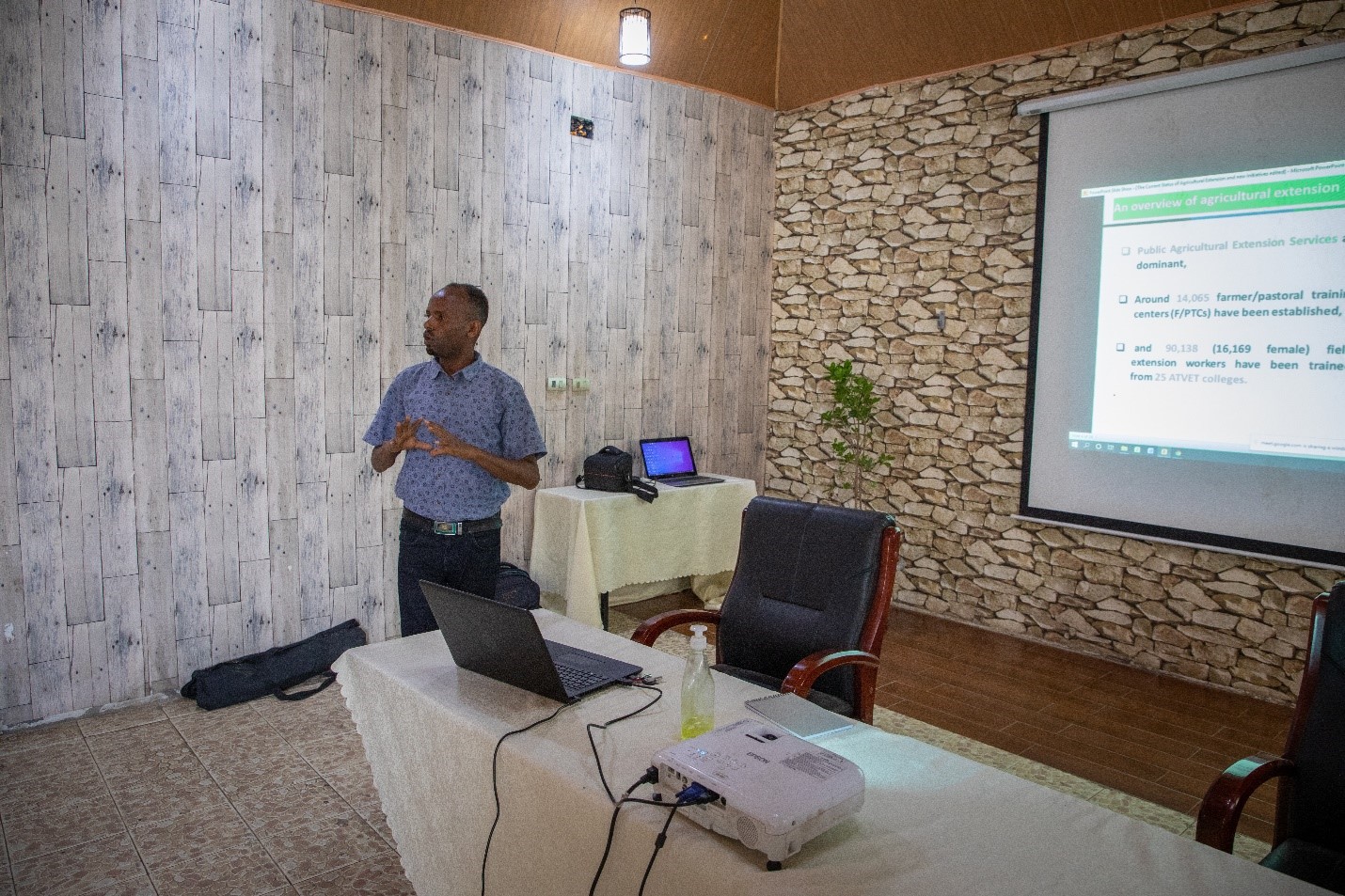 Ato Alemayehu, Ministry of Agriculture, Representative of Extension Directorate
Ato Alemayehu, Ministry of Agriculture, Representative of Extension Directorate2. Overview of The Ethiopian Agricultural extension system (Presented by Ato Alemayehu, from the Ministry of Agriculture, Extension Directorate)
The presentation has showed the current and future trends in the Ethiopian Agricultural System approaches and strategies including digital extension supports, where it was pointed out that a new multi-stakeholder intervention and mandate zonation approaches were highlighted as the instrumental mechanisms in the extension system. The upcoming technological intervention mandate zonation strategy will provide the opportunity for NGOs to involve in zone-based specialization. The presentation has also indicated the experiences of the ministry of Agriculture on PPT and the possibilities of ISD to involve in the zonation-based intervention on PPT and other technologies. Some of the issues raised by the participants after the presentation were:
- What experiences so far exist on PPT by other actors other than those undertaken by ISD? What opportunities does ISD have to upscale the PPT through the ministry of Agriculture?
Basically, there are some research-based interventions that introduced the PPT. However, there is still the need for a more organized and consolidated follow up and support. As to the opportunities to upscale the PPT through the ministry of Agriculture, the upcoming multi-stakeholder extension approach will provide room for development organizations to be involved in specialized development interventions in collaboration with the ministry of Agriculture. This shall be elaborated and communicated further in due course of time.
- How is the ministry of Agriculture planned to realize the digital extension system and how this helps in upscaling the PPT?
The MoA has now become committed to introduce an extensive digital extension system. To date, about 33,000 mobile tablets have been purchased and distributed to the grass-root structure. This will be followed by training. Moreover, Farmers’ Training Centers (FTCs) shall be strengthened and will operate under a pluralistic extension approach to make them self-sustaining. They shall use the land allocated for them both for demonstration and income generation. This approach will also follow market-based production systems, where DAs will support farmers to produce market-oriented crops.
3. Participatory Value Chain and Market Integration Mapping (by Dr Fredrick Aila, Maseno University, Kenya)
The presentation showed the nature of value chains and market integration in the PPT crops with major focus on the seed system. The seed system value chain comprises of individual and institutions that conduct breeding research, selection, development, production, multiplication, processing, storage, diffusion, distribution and marketing of the seeds. In this regard, the practices, experiences and challenges of the seed system value chain of the UPSCALE Project implementing counties has been discussed. Moreover, participants were divided in to three groups and conducted a SWOT analysis on the seed system value chain.
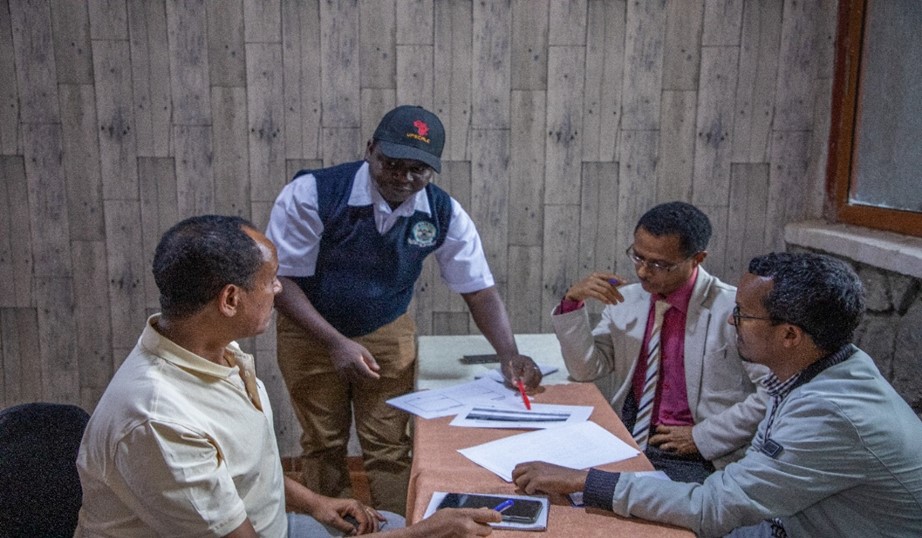 Dr Fredrick Aila, Maseno University, Kenya directing a group discussion
Dr Fredrick Aila, Maseno University, Kenya directing a group discussion- As Desmodium seed can be produced in Ethiopia, what opportunities do we have to the Desmodium seed system and upscaling the PPT?
During the discussion, it was stated that Desmodium seed supply was scarce and difficult to find from local source in other UPSCALE Project implementing counties. As an opportunity, it was proposed that if these sister countries import Desmodium seed from abroad, an option can be the Ethiopian farmers to be supported and produce quality seed and export it to these counties.
The issue of producing quality Desmodium seed from Ethiopia for export purpose was noted as an action point so that the MAC needs to discuss it further, prepare road map, discuss it with the MoA and other pertinent institutions, prepare a detailed plan of implementation. In doing so, formal and informal governmental and farmer institutions should be addressed.
4. Participatory Social- Ecological and climate modelling in UPSCALE (by Dr. N. Alexandridis (ULUND) and Dr. A. Olagoke (LUH) Universities.
This presentation was a discussion on an ongoing research activity which focuses on the influence of household farmland holding size on different socio-economic and climatic aspects. A thorough discussion was made on the correlation of household land holding size to different determinant socio-economic and climatic aspects in the Ethiopian smallholder farmer context.
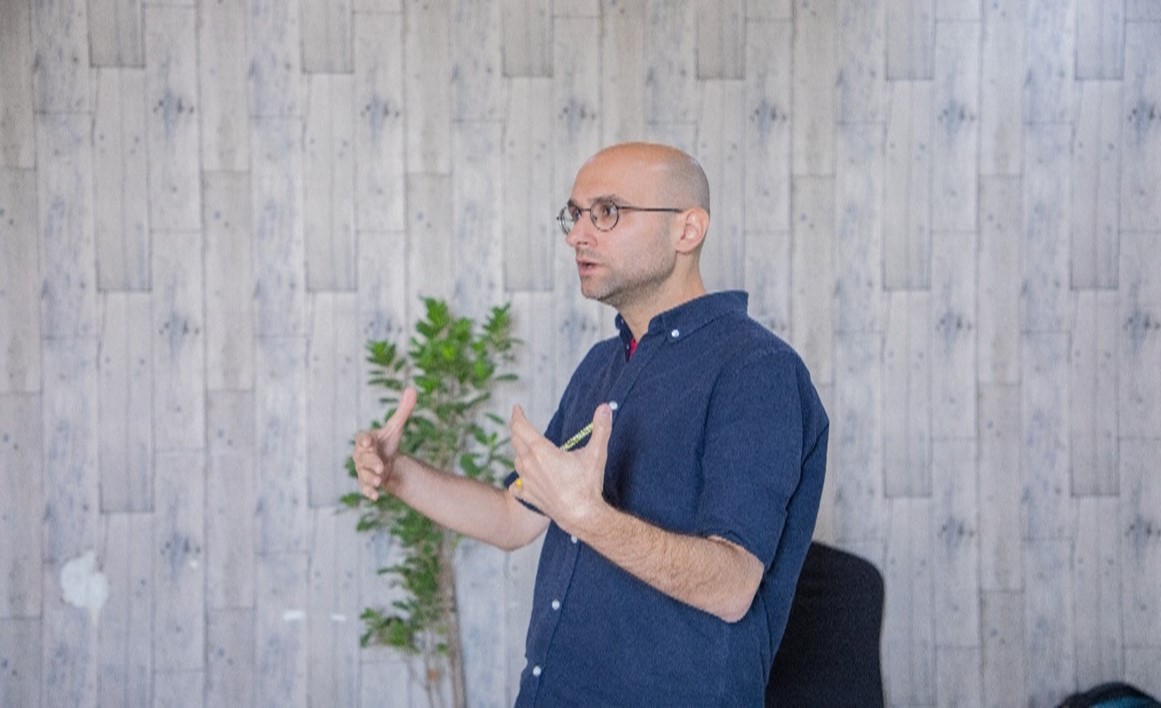 Dr. N. Alexandridis, ULUND, briefing on the concept of Social-Ecologigal modelling
Dr. N. Alexandridis, ULUND, briefing on the concept of Social-Ecologigal modelling5. MAC Activities in Year 2 (Project related /MAC generated/ networking with other projects)
(Presented by Dr. Hailu Araya, MAC Chairperson)
The MAC Plan for the year 2022 was presented and the audiences reviewed it. Accordingly, issues which are considered important were suggested to be included in the second year annual MAC plan. The participants have recommended to include a policy briefing activity for policy makers so that they can have a proper knowledge on PPT. A consolidated summary of the nature, status and future actions needed, which indicates the theory of change and PPT roadmap, have to be prepared and presented for policy makers. Moreover, farmers’ field days were considered to be important and recommended to be strengthened. In fact, the ISD has informed participants that a plan for farmers’ field day was included in the annual plan.

